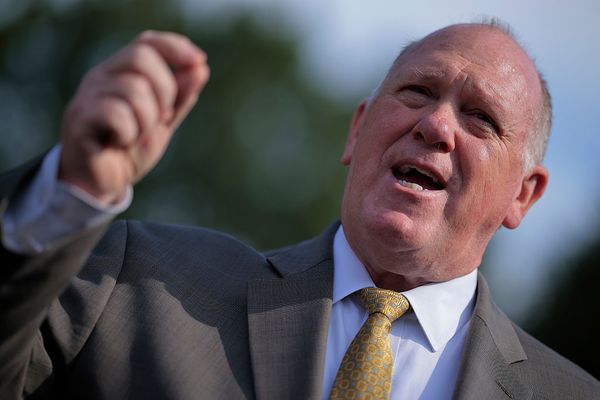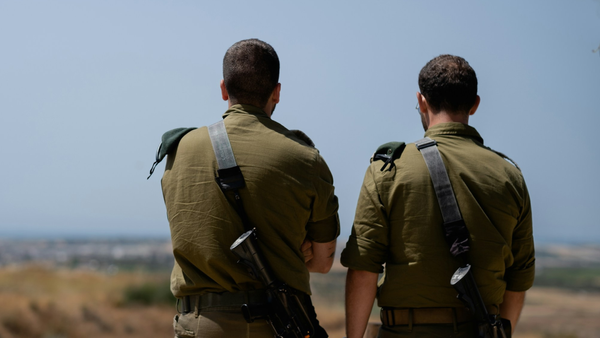
Good morning. Amid escalating far-right violence across the UK over the past week, the instigators and apologists for the rioting have sought to spread a pernicious myth: the idea that white far-right “protesters” are the victims of a “two-tier” policing system that treats them more harshly because of their race and political views.
It’s an idea that has been propagated by Tommy Robinson, Laurence Fox, and various other rightwing social media demagogues in the past few days; it has even been blamed for an arson attack on a police station in Sunderland. Yesterday, Reform MP Nigel Farage claimed that “ever since the soft policing of the Black Lives Matter protests, the impression of two-tier policing has become widespread”. Spend more than a few minutes on social media looking at posts supportive of the violence, and the phrase “two-tier policing”, or a hashtag referring to the prime minister, #twotierkeir, is likely to come up.
For an idea that is gaining significant traction, though, there is very little good evidence available that supports it. Today’s newsletter, with public order policing expert Graham Wettone and reporting from the Guardian’s police and crime correspondent Vikram Dodd, separates the claims being made by the far right from the reality. Here are the headlines.
Five big stories
Middle East | Iran has called in foreign ambassadors based in Tehran to assert its moral duty to punish Israel for what it sees as its “adventurism” in assassinating Ismail Haniyeh, the Hamas leader, in the Iranian capital. Many leaders in the Gulf are willing to condemn Israel’s actions but have also been calling for Iran to show restraint.
Far right riots | Downing Street has criticised comments by Elon Musk, who posted on X that “civil war is inevitable” in the UK. After Keir Starmer’s spokesperson said that “there’s no justification for comments like that”, Musk later attacked Starmer’s promise to protect Muslim communities, writing: “Shouldn’t you be concerned about attacks on *all* communities?”
Economy | Wall Street suffered its worst day in almost two years after a global stock market sell-off sparked by fears of recession in the US. But Japanese stocks soared more than 10% early on Tuesday, while other Asian markets also appeared to have settled somewhat.
Bangladesh | The prime minister of Bangladesh, Sheikh Hasina, has resigned and left the country, the head of the army has confirmed, amid some of the worst violence since the birth of the south Asian country more than 50 years ago.
Media | More than 18 months since a horrific accident on the set of Top Gear, Andrew “Freddie” Flintoff has revealed his struggles with anxiety, nightmares and flashbacks after suffering life-changing injuries. Flintoff was driving an open-topped three-wheel car when it flipped and slid along the track at Surrey’s Dunsfold aerodome in December 2022.
In depth: ‘Of course there are tiers – but they aren’t based on preference or favouritism’
One index of the mainstreaming of the idea of two-tier policing: yesterday Keir Starmer, home secretary Yvette Cooper, Conservative leadership hopeful Priti Patel and the Metropolitan police chief Sir Mark Rowley were all asked about it.
Cooper, Starmer, and Patel all rejected the claim. (Rowley said nothing, but grabbed at the reporter’s microphone.) That establishment consensus probably does little to persuade the conspiratorially minded that the proposition is untrue – but the reality is that the evidence does not support it.
“There are tiers in policing response,” said Graham Wettone, who spent 30 years in frontline public order roles with London’s Metropolitan police and is the author of a book, How To Be A Police Officer. “Of course there are – because you make operational decisions appropriate to the severity of the situation. But there are not tiers based on preference or favouritism.”
***
What is the origin of the claims?
Far-right agitators online support their theory by pointing to the policing failures that allowed organised grooming gangs of predominantly Asian men to operate in Rochdale in the 2000s. They also claim that the Black Lives Matter protests in 2020 were treated with kid gloves.
The Rochdale scandal has at least some basis in the reality that the abuse there was scandalously ignored by police. But the argument that it is a factor in policing today ignores major reforms to the way child sexual exploitation is treated in the region, including the addition of a specialist unit in Greater Manchester police and every Ofsted inspection since 2014 finding that Rochdale now responds to reported cases effectively. Meanwhile, a major Home Office study published in 2020 found no evidence that any one ethnic group is over-represented in cases of child sexual exploitation, and that “group-based offenders are most commonly white”.
The Black Lives Matter protests, meanwhile, were qualitatively different from the events of the last week, as centrally organised protests where any disorder was a relatively marginal feature rather than their guiding purpose. Priti Patel rejected the comparison, saying: “There’s a clear difference between effectively blocking streets or roads being closed to burning down libraries, hotels, food banks and attacking places of worship.”
“There was actually plenty of criticism of the BLM policing for being heavy-handed,” Wettone points out. “The Met used an advance of the mounted branch, one of their most impactful tactics, which I’ve only seen deployed a couple of times in my whole career, and not at any of the incidents in the last week.”
Then there are the points that the far right tend to simply ignore because they are unhelpful to their case. The most obvious of these is the way that environmental protest has been policed and treated in the courts – take the five Just Stop Oil campaigners recently jailed for upwards of four years for planning to block the M25. While the sentencing is not a police matter, it hardly points to a system that is hopelessly biased to the left. The draconian sentences handed down after the 2011 riots point in the same direction.
There is meanwhile evidence that the Metropolitan police is still riven by institutional racism. A report by Dame Louise Casey in March found “racism, misogyny and homophobia in plain sight” in the Met, and that stop and search and the use of force are still used excessively against Black people.
***
How have the claims gained traction?
Against that backdrop, the claims of a two-tier system had gained currency even before the events of the last week, with claims about the policing of the pro-Palestinian protests in the UK since the 7 October attacks. Robert Jenrick, now a Conservative leadership candidate, claimed in March that two-tier policing governed the police’s handling of those protests.
Meanwhile, those on the far right have claimed the treatment of recent unrest in Harehills, Leeds after children from a Roma family were taken into care revealed the police were unwilling to act when the agitators were from a minority background. And videos have circulated on social media in recent days of what are claimed to be “Asian gangs” attacking white “protesters” with impunity.
But these claims don’t stand up to scrutiny either. All of the evidence of those who attended and monitored the Gaza protests suggests that while there were pockets of disorder, the vast majority of those who attended did so peacefully. “There were arrests, and police identifying offences that have led to prosecutions,” Wettone said. “But those who stayed within the law were rightly allowed to protest.”
There were claims then, too, that there were “extremists from all sides” responsible for disorder on Armistice Day that was in fact the product of the far right. This piece from November explains the clear difference between the two sides’ behaviour.
The circumstances in Harehills, meanwhile, were very different: West Yorkshire police were the direct target of the unrest, arguably making their presence an exacerbating factor. “It started out looking like a standard call that many officers will go to, an incident at an address with social services trying to remove children,” said Wettone. “And then it blew up with officers coming under attack – the fact that some of them turned their backs and ran away suggests they had received minimal public order training. And because of how quickly it escalated, withdrawal is the best tactic.”
Some of the videos of “Asian gangs” do appear to be real recordings from the last few days – and there was an intense confrontation between the far right and a group of Asian men in Bolton. But the scale of these incidents pales in comparison to the far-right activity of the past week, and does not justify headlines framing events of Sunday as equal clashes between the two sides. “Clearly there have been some incidents,” Wettone said. “But it does’t seem to be pre-planned in the same way, and the police can’t generally stop a group of lads walking down the road if no crime has been committed.”
***
How has the violence of the past week been policed?
The bottom line is this: the level of the violence, and the fact that it was not an occasional byproduct of the gatherings but their deliberate and persistent aim, puts them in a qualitatively different category from the other policing operations that have been mentioned.
So does the fact that these “protests” that have turned into riots were not organised in consultation with the police, like those over Gaza, but set up chaotically and with contempt for the idea that they should be subject to the law.
Chief constable BJ Harrington, the national lead for public order policing, put it like this to Vikram Dodd: “We have seen large groups of people coming together intent on one thing, violence. They masquerade as protesters … We have not seen this level of violence or planned intent of violence from other large marches. This is not about being frustrated or wanting to give the police the runaround to get publicity, this is about trying to frighten communities, damage property and attack police officers.”
A different approach is therefore warranted, Wettone said. “It isn’t about numbers. It’s about the risk and the threat that people pose.”
What else we’ve been reading
The latest in our Big Idea series asks: how do you get rid of a dictator? It’s no easy task, writes Marcel Disus – but a problem that is likely to dominate much of the 21st century. Toby Moses, head of newsletters
Joe Mulhall, the research director of Hope Not Hate, argues that the far-right riots are inextricably linked to the treatment of Muslims and asylum seekers in mainstream media and politics. “Far-right politics is not a tumour that hangs off our body politic, something separate and distinct,” he writes. “It is an infection within it, and one that can spread.” Archie
What’s behind our summer of smut? Zoe Williams has spent a couple of weeks reading nothing but erotica, discovering a world of furries, faeries and every other kink imaginable. Toby Moses, head of newsletters
This week’s How we made is about a song beloved to all Sopranos fans: Journey’s Don’t Stop Believin’. Mindblowing revelation: there’s no such place as South Detroit! Archie
If you’ve been glued to the Olympics like me, home favourite Léon Marchand (dubbed le baguette by his American training partners) has captivated during the opening week with his incredible feats in the pool – but with the swimming coming to a close, Andy Bull writes about the controversy still swirling due to doping accusations about Chinese athletes. Toby
Sport
Paris 2024 | Keely Hodgkinson stormed to victory in the women’s 800m final, taking Great Britain’s first athletics triumph in Paris and first athletics gold since 2016. Earlier, the women’s cycling sprint team of Emma Finucane, Katy Marchant and Sophie Capewell broke the world record three times on their way to winning gold against New Zealand in a thrilling final.
Cricket | Leading figures from English cricket have paid tribute to Graham Thorpe, one of the finest batters of his generation, after he died at the age of 55. Alec Stewart, who played with Thorpe at Surrey and with England, hailed him as a “legend” while one of Stewart’s successors as Test captain, Joe Root, described Thorpe as a “hero”.
Football | The Football Association board have given formal approval for the appointment of a foreign manager to replace Gareth Southgate. The Guardian has learned that the chief executive, Mark Bullingham, went to his nine fellow board members to gain their backing to approach foreign candidates before beginning the recruitment process. The board are understood to have endorsed Bullingham’s request without putting it to a vote, although there were some dissenting voices.
The front pages
“Far-right attacks should be seen as terrorism, says ex-police chief” is the Guardian’s lead story, while the Daily Mail has “Anger over Elon Musk claim UK ‘civil war is inevitable’”. Similarly the Times reports: “Musk draws fire from PM with claim of ‘civil war’” and the Telegraph has “Starmer in spat with Musk over riots”. “Too scared to leave our homes” – the Daily Mirror covers the plight of families in the riot zones. The Daily Express leads on Met commissioner Mark Rowley’s reaction to a question about “two-tier policing” of riots, mentioned above. “UK to deploy ‘standing army’ of riot police – but officers fear shortages” – that’s the i and the Metro reports that angle as “Supercops get the call-up”. Top slot in the Financial Times goes to “Global stock markets fall sharply as fears over US recession drive sell-off”.
Today in Focus
Inside the prisoner exchange that set an American journalist free
Russian affairs reporter Pjotr Sauer talks about the imprisonment and eventual release of his friend, the journalist Evan Gershkovich.
Cartoon of the day | Ben Jennings
The Upside
A bit of good news to remind you that the world’s not all bad
Stretching over 230 miles, the Chao Phraya River is the largest waterway flowing through central Thailand. Home to tigerfish, catfish and more, the river is also the source of 4,000 tonnes of plastic waste entering the Gulf of Thailand every year.
Phra Mahapranom Dhammalangkaro, the abbot of the Wat Chak Daeng temple which overlooks the river, had already sought to fight back against this pollution through building a recycling centre in his temple’s grounds. Now, with the addition of the solar-powered Hippo boat, created in conjunction with the Seven Clean Seas organisation, they will aim to drastically reduce this pollution – turning collected plastics into fabric for monk’s robes, bags and blankets, as well as oil and fertiliser.
“People can make [Buddhist] merits by giving us plastic bottles, bags and paper,” says Dhammalangkaro of the scheme that aims to remove 1.4m kilos of plastic waste from the river each year.
Sign up here for a weekly roundup of The Upside, sent to you every Sunday
Bored at work?
And finally, the Guardian’s puzzles are here to keep you entertained throughout the day. Until tomorrow.







